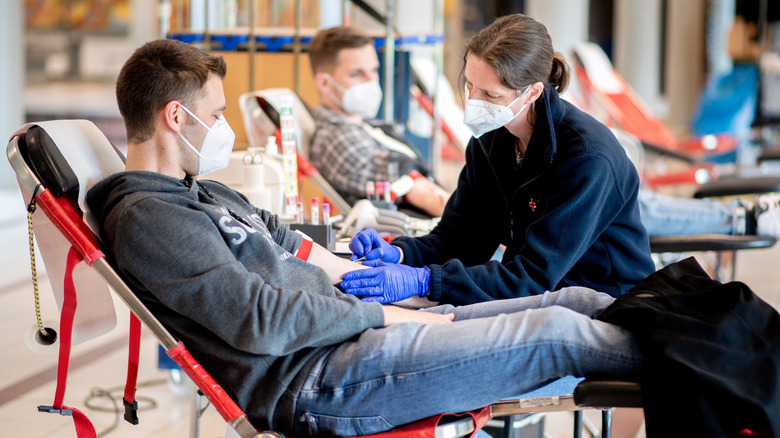The Real Reason Not Everyone Can Donate Blood
Donating blood is a necessary and generous act that can help medical professionals perform and deliver life-saving care. In fact, Ross Coyle, spokesperson for the Stanford Blood Center, tells SingleCare, "A single blood donation can save the lives of up to three people." Readily available blood is also in constant and high demand. According to the American Red Cross, someone in the United States needs blood or platelets every 2 seconds, but only 3% of Americans actually give blood every year.
As a result, blood banks are constantly encouraging walk-ins and recruiting volunteers to donate blood. "Donated blood is used for trauma patients such as those injured in natural disasters or mass tragedies, cancer patients who require blood transfusions and those who lose blood during major surgeries," Dr. John Cunha, an emergency medicine physician at Holy Cross Hospital in Fort Lauderdale, Florida, told SingleCare. "You never know when you or a loved one might need a blood donation."
Who can't donate blood?
Despite the constant need for donations, however, not everyone is eligible to donate blood in the U.S. In fact, you can be disqualified from giving blood for a number of reasons. For instance, you will not be able to donate blood if you're taking certain medications, like antibiotics. If you're taking medicine to treat an infection, you will need to wait until you have finished your course of antibiotics or until the infection clears up (via The Healthy).
You can also be denied from donating blood if you've recently acquired a new tattoo or piercing. That's because people with new tattoos run the risk of contracting and carrying blood-borne viruses, like hepatitis and human immunodeficiency virus (HIV). Since people who have these conditions are prohibited from giving blood, those with recent piercings and tattoos must wait three months before they can donate blood again.
Furthermore, FDA guidelines state that men who have sex with men are required to abstain from sex for three months before they can donate blood (via Medical News Today). This deferral period used to be 12 months but was changed during the COVID-19 pandemic due to a national blood shortage. Although this guideline is meant to prevent the transmission of HIV and other sexually transmitted diseases, all blood donations are tested for these diseases before they are given to patients in need of a blood transfusion.


